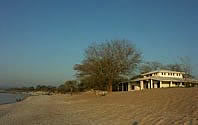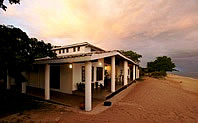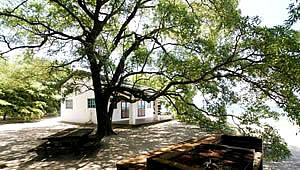THE BEACH HOUSE

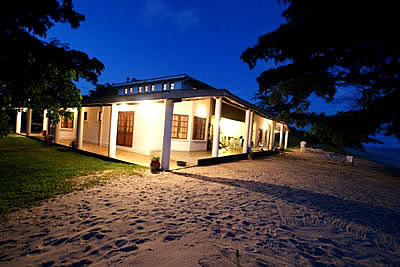
Beauty on the Beach
Lake Malawi is one of Africa’s unspoiled jewels, still almost unknown to international tourism. Lying at the southern end of Africa’s Great Rift Valley, it is 355 miles north to south, up to 50 miles wide. It is the third largest lake in Africa and twelfth in the world. It is home to an estimated 600 species of colourful fish, beloved of aquarists worldwide. Many of these are still evolving in their uniquely small environments - around the isolated islands dotting the lakeshore.
Lake Malawi’s Northern lakeshore, shelving rapidly to depths over 700m, is the most unspoiled part of a pristine lake. The silver sands of Chintheche, where mango trees swoop down to the water’s edge, now attract visitors from all over the world
The Beach House looks down the Lake, facing southwest. It sits uniquely at the edge of the dunes protected from the prevailing mwera wind by two beautiful shade trees, a Natal pod mahogany and a silver-green leaved nyapini of the terminalia family. The sun rises in winter at one end of the beach and sets at the other. In summer the sunrise over the distant islands of Chizumulu and Likoma is a photographer’s dream. Many of the most evocative pictures of Lake Malawi, used in the country’s tourism promotional brochures and web sites, have been taken on and from this beach

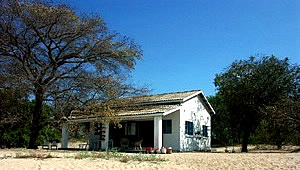

There are four large bedrooms - either twin or double beds - with four-poster mosquito nets, en suite bathrooms. The lounge area is very spacious and furnished in traditional colonial style with many old maps and prints of Nyasaland and its lake. A splendid khonde, (patio), balcony and terrace offer the very best of outdoors life in the tropics - in an open conservatory setting with many plants in huge pots.
The fruit orchard at the rear provides lemons and mangoes while pineapples are usually readily available. The local fish chambo, kampango, ncheni and the whitebait-like usipa can often be bought – when the moon and wind are right - from the dugout fishermen, right on the adjacent beach, at dawn. A well-equipped kitchen allows the widest range of self-catering while house servants and cooks are available to help. There is a large fridge and freezer. Al fresco dining on the beach or under the trees is possible with the barbecue.
In Chintheche, just 2km away on the tar road, there is a branch of the Peoples Supermarket chain. All kitchen and household essentials can be purchased there. Fresh fruit, vegetables eggs, chickens and often fish are also on sale, seven days a week, at the local market in the middle of the village.
Nightly, except when the moon is full and competes for the attention of the fish, the fishermen cast their nets from their dugouts using on-board flares and beacons. Dozens of these create a memorable spectacle, of timeless beauty.
Getting There. There is a simple airstrip at Chintheche suitable for small aircraft and private charters. Kamuzu International airport at Lilongwe is half an hour away by air and three and half hours by road through the Nkotakota Wildlife Reserve. Mzuzu, main city of Northern Malawi, is one hour away on a lovely scenic route winding up the shoulder of the Great Rift Valley, through banana plantations, rice paddies, rubber plantations and beside tea and coffee estates. The tiny airport there is served by Air Malawi and local charter operators. Clients staying at the Beach House can be met by prior arrangement either at Chintheche’s airstrip or at Mzuzu Airport.
To see and do. The Beach House appeals most to those seeking get-away-from-it-all holidays. While there are landline telephones and cell phone coverage is good, there is no satellite television, just a library full of good books and games for the family. Dugouts can be hired as a challenge for those with a well developed sense of balance. The gently sloping sandy beach is very suitable for launching powerboats off trailers.
Kande Horse offers riding by the hour on a wide selection of pedigree horses, many saved rescued in Zimbabwe’s agricultural collapse – on the beaches of Kande or in the forests rising up to the Viphya Plateau.
Vizara Rubber Estate is 20km to the north and coffee estates, which nestle in folds of the fertile hills above the lake. To the south are the irrigated sugar fields of Dwangwa.
Nkhata Bay is one of the few northern lakeshore ports and north of it are the beautiful lakeshore villages of Usisya and Ruarwe, often inaccessible except by boat.
Across the lake the island of Likoma boasts a magnificent cathedral from the heyday of the Universities Mission to Central Africa, established through David Livingstone’s efforts. The resort of Kaya Mawa sits on a promontory on the south-east shores of Likoma while on the wild shores of the Mozambique littoral, Nkwichi Lodge is making a name for itself as a genuine eco-tourism venture complete with many community initiatives. Both are just over an hour away - in good weather and in a powerboat with a big-engine.
Bandawe was home to the second Livingstonia Mission stands right across the bay below the hill of that name. Its churches and cemetery bear witness to the valiant efforts and innumerable hardships faced by those early missionaries.
Vwaza Game Reserve and its many elephants around Lake Kazuni make a lovely excursion inland while Nyika National Park, high (2500m) on the rolling grasslands of the Nyika Plateau, is 100km further but deserves a stay at the lovely Chelinda Lodge.
A Note on Health
Malaria, a risk at all times but especially during the rainy season, January to April, is preventable if visitors take the prescribed prophylactics and avoid getting bitten. Insect repellent sprays, mosquito coils and of course the mosquito needs provided help ensure that.
Bilharzias or schistosomiasis is found in several areas of Lake Malawi especially where water is stagnant and weed grows. The vigorous wave action at Chintheche combined with the sandy beach means that bathing in the lake is quite safe there.
